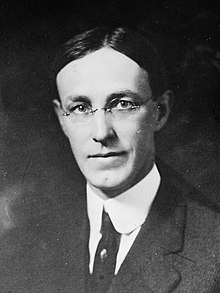Education and Democracy
A popular figure in the early 20th century who has since faded, Meiklejohn was a philosopher and university president who championed unified knowledge, idealism, and Great Books curricula.
Meiklejohn developed a legacy of autocratic treatment of faculty, drastic overspending, and that of a college hermetically detached from demands of the outside world.
He was ousted after lying about faculty appointments, whereupon he opened the Experimental College at the University of Wisconsin,[9] a two-year Great Books program with readings from ancient Greece and modern America.
Nelson compares Meiklejohn to fellow educator Woodrow Wilson: "idealists who occasionally allowed the enthusiasm of their vision to impede the integrity of their leadership".
[12] Other reviewers marked the book's balance,[5] completeness,[3] and importance in resurfacing Meiklejohn as a major figure in the history of American education.
[8] Jinting Wu (Education Review) complained of too much intellectual context in areas and of unresolved contradictions in Meiklejohn's metaphysical claims.
[13] He wrote that Meiklejohn's views on curriculum would arouse "needed" reflection in college instructors,[2] and that the book's audience should include university administration and those interested in civil liberties as well as historians and philosophers of education.
[5] Robert Sherman, writing for the History of Education Quarterly and reflecting on the depth of the appendices, struggled to consider "how such a work could be more complete".
[3] He wrote through Louis Menand that Meiklejohn's "certitude [led] to violence" and that by letting him speak for himself, Nelson made the French philosopher Charles Renouvier's point that only individuals are certain and that there is no greater certainty.
[15] Guenter added that the biography read best in the parts where Nelson was clearly inspired by Meiklejohn's zeal and idealism, particularly the "What Does the First Amendment Mean?"
